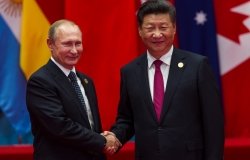Bangladesh's Barometer: Impending National Elections Amidst Political Conflict and Rising Islamism
Ali Riaz, Illinois State University; Tariq Karim, University of Maryland; commentator: William Milam, senior policy scholar, Woodrow Wilson Center
Overview
Initiating this forum on Bangladesh's political barometer, Tariq Karim addressed the origins of the sharp political polarization in Bangladesh. Part of the answer, he said, lies in the character of the people of Bangladesh, who are often divided between the Muslim identity and the Bengali identity. Karim traced the origins of Bangladesh's political frictions to the Cold War era. The country has a secular democratic mandate, which projects the "soft face of Sufi Islam and promotes vibrant pluralism." However, the rising specter of militant Islamism is the real threat for the nation. "Within a generation, many Bangladeshis might not even know that a soft Islam ever existed," Karim stated. On the other hand, Bangladesh has established a solid reputation for developing institutions that meet its domestic challenges, whether in the form of microcredit financing or in the creation of a non-party caretaker government that acts as the government between successive party elections. However, the institutional neutrality and credibility of the caretaker government system have become the subject of fierce debate and close scrutiny by national and international civil society.
Ali Riaz contended that meeting the three conditions of a free, fair and timely election are "almost impossible at the same time." The upcoming elections can either be free and fair, or they can be timely. The elections will be significantly affected by the rising presence of militant Islamist groups in the nation. The largest terrorist attack on Bangladeshi soil occurred on August 17, 2005, which involved the coordinated detonation of 450 homemade bombs across 26 districts and demonstrated how organized the national militant Islamic groups are. These groups have received material and ideological support from political parties as inter-party conflict has offered ample room for them to thrive and strategize with impunity. Militant Islamism, Riaz stated, illustrates the crisis of legitimacy in the ruling political regimes post-1995 and symbolizes the weakness of multi-party representative democracy. Creating a taxonomy of the wide array of Islamic groups is important in order to understand that they are not homogenous. There is a simultaneous integration and disintegration of the groups, as they acknowledge that they cannot wage the Islamist battle on their own while also conflicting against each other internally. This paradox creates some space for maneuver, which can be channeled towards reducing the violent impact of the Islamist groups.
Commentator William Milam noted that when people ask him whether Bangladesh will turn into another Afghanistan, his reply is that the danger is actually of Bangladesh turning into another Pakistan. This is a serious challenge, Milam argued, as growing inequality between the northern and southern provinces of Bangladesh and the increasing number of strikes against privatized electricity companies and garment factory owners point to the same pattern of economic divisions seen in Pakistan. On the bright side, civil society is awakening. "It has suddenly woken up after the August 2005 terrorist bombings and it will reassert itself," Milam concluded.
Drafted by Bhumika Muchhala, Program Associate, Asia Program
Tel: 202/691-4020
Robert M. Hathaway, Director, Asia Program
Hosted By

Indo-Pacific Program
The Indo-Pacific Program promotes policy debate and intellectual discussions on US interests in the Asia-Pacific as well as political, economic, security, and social issues relating to the world’s most populous and economically dynamic region. Read more
Thank you for your interest in this event. Please send any feedback or questions to our Events staff.










